
BMC Nutrition
Scope & Guideline
Unveiling the Science Behind Nutritional Choices
Introduction
Aims and Scopes
- Nutritional Epidemiology:
The journal publishes research that investigates the relationships between diet, health outcomes, and disease prevalence, emphasizing studies that explore how dietary patterns affect various health conditions. - Intervention Studies:
BMC Nutrition features randomized controlled trials and other intervention studies that evaluate the effectiveness of dietary modifications and nutritional programs in improving health outcomes across different populations. - Socioeconomic and Cultural Influences on Nutrition:
The journal addresses how socio-economic status, cultural practices, and environmental factors influence dietary habits and nutritional status, particularly in low- and middle-income countries. - Public Health Nutrition:
Research focused on public health policies, nutrition education, and community-based interventions is a core area, aiming to improve dietary practices and health outcomes at the population level. - Micronutrient Deficiencies and Nutritional Status:
BMC Nutrition emphasizes studies on micronutrient deficiencies, particularly among vulnerable groups such as children and pregnant women, to inform public health strategies. - Food Security and Insecurity:
The journal explores the impact of food security and insecurity on nutritional outcomes, examining the interplay between access to food, economic factors, and health. - Dietary Patterns and Health Outcomes:
Research on specific dietary patterns (e.g., Mediterranean, DASH, plant-based) and their associations with health outcomes is frequently published, contributing to the understanding of optimal dietary practices.
Trending and Emerging
- Impact of COVID-19 on Nutrition:
Research examining the effects of the COVID-19 pandemic on dietary habits, food security, and nutritional status has surged, reflecting a timely response to global health challenges. - Plant-Based Diets and Sustainability:
There is a growing interest in studies exploring the health benefits of plant-based diets, as well as their implications for sustainability and environmental health. - Mental Health and Nutrition:
Emerging research is increasingly linking dietary patterns and nutritional status with mental health outcomes, highlighting the importance of nutrition in psychological well-being. - Nutritional Interventions for Chronic Diseases:
Interventions targeting chronic diseases such as diabetes, obesity, and cardiovascular conditions are a rising focus, emphasizing the role of nutrition in disease management. - Digital Health and Nutrition Apps:
The use of digital tools and mobile applications to promote healthy eating behaviors and track dietary intake is an emerging area of research, reflecting technological advancements in health promotion. - Micronutrient Supplementation and Public Health:
Research on the effectiveness of micronutrient supplementation in addressing public health issues, particularly in high-risk populations, is gaining attention, addressing pressing global health concerns. - Behavioral Nutrition and Eating Habits:
There is an increasing emphasis on understanding the behavioral aspects of nutrition, including the psychological and social factors that influence dietary choices.
Declining or Waning
- Traditional Dietary Practices:
Research focusing on traditional dietary practices and their health implications has decreased, indicating a shift towards more contemporary dietary patterns and interventions. - Food Processing and Industrial Nutrition:
There has been a noticeable decline in studies related to the impact of food processing on nutrition, possibly due to a growing focus on whole foods and minimally processed diets. - Nutrition in Older Adults:
The exploration of nutritional issues specifically affecting older adults has waned, suggesting a potential gap in research addressing geriatric nutrition challenges. - Food Safety and Security:
While still relevant, research specifically focused on food safety issues has become less prominent, possibly overshadowed by broader discussions on food security and nutrition interventions. - Nutritional Education in Schools:
There has been a reduction in studies specifically examining nutritional education programs within school settings, indicating a shift towards community and family-based interventions.
Similar Journals

South African Journal of Clinical Nutrition
Fostering interdisciplinary insights in clinical nutrition.South African Journal of Clinical Nutrition is a premier academic journal, published by Taylor & Francis Ltd, dedicated to the field of clinical nutrition and its impact on health and wellness. With an ISSN of 1607-0658 and an E-ISSN of 2221-1268, this journal has embraced an Open Access model since 2016, providing unrestricted access to current research and developments in nutrition-related sciences. Originating from the United Kingdom, this journal serves as a vital resource for researchers, professionals, and students, featuring a diverse range of studies that reflect contemporary issues in human nutrition and dietetics. Recognized for its contribution to the field, the journal holds a Q3 ranking in both Medicine (miscellaneous) and Nutrition and Dietetics, signifying a credible platform for disseminating innovative nutritional research. The journal's comprehensive scope ensures that it fosters interdisciplinary dialogue and supports advancements in nutritional science from 2001 to 2024, making it an essential reading for anyone committed to enhancing the understanding of nutrition's role in public health.
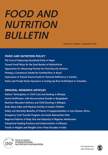
FOOD AND NUTRITION BULLETIN
Connecting Science with Culinary ExpertiseFOOD AND NUTRITION BULLETIN, published by SAGE Publications Inc, is an influential academic journal dedicated to advancing research in the fields of food science, nutrition, and dietetics. With an established history since 1982, this periodical has become a vital resource for researchers, practitioners, and students seeking to understand the complexities of food and nutrition within various contexts. Holding a commendable impact factor and categorized within the prestigious Q2 and Q1 quartiles across multiple relevant fields, it boasts significant rankings in Scopus, including the 73rd percentile in Geography, Planning and Development. The journal fosters scholarly discourse and innovation by disseminating the latest findings, reviews, and theoretical discussions aimed at improving public health and nutrition policy. By focusing on evidence-based research and interdisciplinary perspectives, the FOOD AND NUTRITION BULLETIN plays a crucial role in shaping future research and practice in the ever-evolving landscape of food and nutrition.
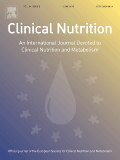
CLINICAL NUTRITION
Connecting Clinicians and Researchers for Optimal Nutrition SolutionsCLINICAL NUTRITION, published by Churchill Livingstone, is a premier international journal dedicated to advancing the field of nutrition and dietetics, as well as critical care and intensive care medicine. Established in 1982, the journal has consistently delivered high-quality, peer-reviewed research, celebrated for its impact with an impressive Q1 ranking in both Critical Care and Intensive Care Medicine and Nutrition and Dietetics categories as of 2023. With its emphasis on collaborative discourse among researchers, clinicians, and educators, CLINICAL NUTRITION plays a crucial role in shaping dietary practices and interventions that enhance patient care and recovery. Although the journal does not provide open access, its rigorously curated content remains a vital resource for professionals seeking to implement evidence-based nutrition strategies in clinical settings. The journal is situated in the United States, with operations based out of Edinburgh, Scotland. Researchers are encouraged to engage with this influential publication to stay abreast of the latest findings and innovations within these intersecting fields.
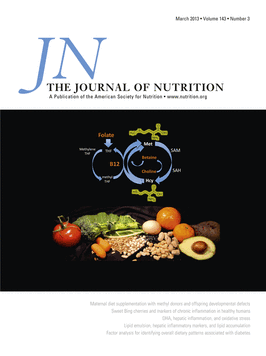
JOURNAL OF NUTRITION
Elevating the standards of nutritional research since 1945.JOURNAL OF NUTRITION is a premier academic journal published by Elsevier Science Inc, dedicated to advancing the understanding of nutritional science and its impact on health. With a long-standing tradition since its inception in 1945, the journal provides a vital platform for high-quality research, featuring articles that cover a wide range of topics within the fields of Medicine and Nutrition and Dietetics. Recognized for its significant contributions, the journal holds an impressive impact factor, with a Q1 rank in both Medicine (miscellaneous) and Nutrition and Dietetics as of 2023, positioning it among the top tier of scholarly publications in these disciplines. The Scopus Rankings further validate its status, boasting a rank of #57/398 in Medicine and #30/140 in Nutrition, indicating its influential presence in the research community. Although it operates under a traditional access model, the journal actively engages with a global audience of researchers, professionals, and students by disseminating cutting-edge insights designed to inform nutrition policy and practice. By focusing on current trends, innovative methodologies, and evidence-based nutrition strategies, the JOURNAL OF NUTRITION continues to be an essential resource for those committed to enhancing health through nutrition.

Nutricion Clinica y Dietetica Hospitalaria
Exploring the Frontiers of Clinical Dietetics.Nutricion Clinica y Dietetica Hospitalaria is a prominent journal dedicated to the field of clinical nutrition and dietetics, published by the SOC ESPANOLA DIETETICA & CIENCIAS ALIMENTACION-SEDCA. Established in Spain, this journal has been a crucial platform for disseminating research and advancements in nutrition since its inception in 1981. Although currently indexed in the lower quartiles (Q4) of the medicine and nutrition categories for 2023, its contributions remain vital to healthcare professionals and researchers focused on enhancing dietary practices and clinical outcomes. The journal operates without open access, requiring institutional subscriptions for full articles, making it a selective source for scholarly work addressing the complexities of dietetics in a hospital setting. As a member of the global conversation on nutrition, Nutricion Clinica y Dietetica Hospitalaria encourages interdisciplinary dialogue and aims to promote evidence-based nutritional practices, hoping to elevate health standards and patient care through innovative research.

Nutrition & Metabolism
Advancing the Frontiers of Nutritional ScienceNutrition & Metabolism, published by BMC, is a leading open-access journal that has been pivotal in advancing research within the domains of nutrition, metabolic science, and endocrinology since its inception in 2004. With an impressive impact in its field, this journal boasts classification in the Q1 category in both Nutrition and Dietetics and Medicine (miscellaneous), as well as Q2 in Endocrinology, Diabetes and Metabolism for 2023. It ranks in the top percentiles of its Scopus categories, highlighting its significance to the scholarly community, with notable placements such as rank 22 out of 140 in Nutrition and Dietetics. The journal's commitment to open access ensures that groundbreaking research is readily available to researchers, practitioners, and students alike, fostering collaboration and innovation across disciplines. Based in the United Kingdom, Nutrition & Metabolism continues to shape the future of nutritional science and metabolic studies, inviting submissions that address pivotal questions and drive the field forward.
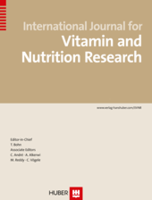
INTERNATIONAL JOURNAL FOR VITAMIN AND NUTRITION RESEARCH
Connecting research with practice in nutrition and health.INTERNATIONAL JOURNAL FOR VITAMIN AND NUTRITION RESEARCH, published by HOGREFE AG-HOGREFE AG SUISSE, stands as a pivotal resource in the intersecting realms of nutrition and health. With a rich publication history spanning from 1971 to 2024, this esteemed journal provides a platform for innovative research in the fields of Endocrinology, Diabetes and Metabolism, Medicine (miscellaneous), and Nutrition and Dietetics. The journal holds a respectable Q3 category ranking in these disciplines for 2023, attesting to its influence within the academic community. Although it does not offer open access, the ISSN 0300-9831 and E-ISSN 1664-2821 identifiers ensure its broad accessibility. Researchers, practitioners, and students alike benefit from its rigorous peer-reviewed content, which greatly contributes to the advancement of knowledge and best practices in nutrition research. The journal's commitment to excellence is further exemplified by its notable rankings in Scopus, where it achieves impressive standings across relevant categories. For anyone involved in the exploration of vitamins, nutrition, and their crucial roles in human health, this journal is an essential tool for staying informed and engaged with the latest scientific developments.
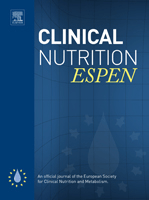
Clinical Nutrition ESPEN
Elevating Standards in Nutrition Science and PracticeClinical Nutrition ESPEN is a distinguished journal published by ELSEVIER, focusing on the critical intersection of clinical nutrition and metabolic health. With an ISSN of 2405-4577, this journal serves as an essential resource for researchers, practitioners, and students in the fields of Endocrinology, Diabetes and Metabolism as well as Nutrition and Dietetics. Operating out of the United Kingdom, it has garnered a respectable Q2 ranking in both categories for 2023, indicating its significant impact and relevance in the field. Although it does not follow an open access model, the journal offers valuable insights into contemporary nutrition research, clinical practices, and dietary interventions, making it a vital tool for those committed to improving patient outcomes through nutritional science. In its evolving journey, covering work from 2015 to 2024, Clinical Nutrition ESPEN continues to shape the dialogue in nutrition research, addressing pressing health challenges and fostering innovation in dietetic practice.
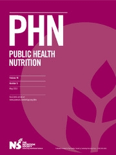
PUBLIC HEALTH NUTRITION
Transforming Dietary Practices for Better HealthPUBLIC HEALTH NUTRITION is a leading journal published by CAMBRIDGE UNIVERSITY PRESS, focusing on the interdisciplinary field of nutrition as it relates to public health. With its Open Access model established in 2022, the journal ensures widespread dissemination of vital research findings for practitioners, policymakers, and academics alike. Based in the United Kingdom, the journal has been pivotal in bridging gaps between nutrition science and public health initiatives since its inception in 1998. It has consistently ranked in the Q2 quartile across multiple categories, including Medicine (miscellaneous), Nutrition and Dietetics, and Public Health, Environmental and Occupational Health, as per the latest rankings. The journal is indexed in Scopus, underscoring its significance and relevance in the academic community, with impressive rankings that place it in the top percentiles of its category. Dedicated to publishing quality research that informs dietary practices and health policies, PUBLIC HEALTH NUTRITION is an essential resource for researchers, professionals, and students committed to enhancing public health through improved nutritional practices.

Nutrition Journal
Advancing the Science of Nutrition for a Healthier Tomorrow.Nutrition Journal is a prestigious open-access publication from BMC, dedicated to advancing the field of nutrition and dietetics since its inception in 2002. With an impressive impact factor and a notable Scopus ranking, it ranks in the top quartile (Q1) in both Medicine (miscellaneous) and Nutrition and Dietetics, highlighting its significant contribution to health sciences. Based in the United Kingdom, the journal covers a broad spectrum of topics, making it an essential resource for researchers, healthcare professionals, and students interested in nutrition's role in health and disease prevention. The journal not only facilitates the dissemination of groundbreaking research but also prioritizes accessibility, allowing global audiences to engage with vital findings that shape dietary practices and public health policies. With a commitment to interdisciplinary collaboration, Nutrition Journal fosters an environment where innovative ideas and evidence-based solutions can flourish, making it a cornerstone reference in the field.